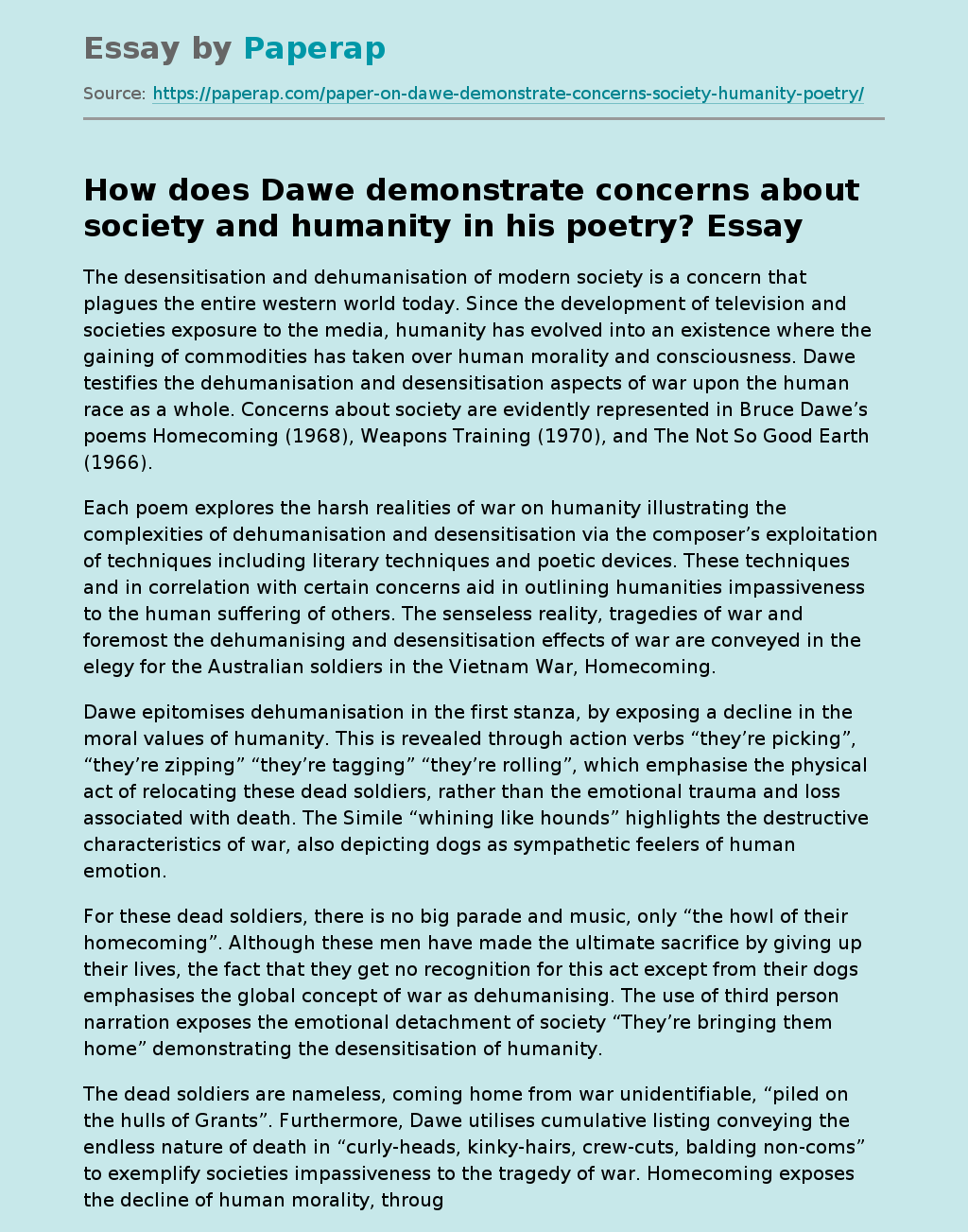How does Dawe demonstrate concerns about society and humanity in his poetry?
The desensitisation and dehumanisation of modern society is a concern that plagues the entire western world today. Since the development of television and societies exposure to the media, humanity has evolved into an existence where the gaining of commodities has taken over human morality and consciousness. Dawe testifies the dehumanisation and desensitisation aspects of war upon the human race as a whole. Concerns about society are evidently represented in Bruce Dawe’s poems Homecoming (1968), Weapons Training (1970), and The Not So Good Earth (1966).
Each poem explores the harsh realities of war on humanity illustrating the complexities of dehumanisation and desensitisation via the composer’s exploitation of techniques including literary techniques and poetic devices. These techniques and in correlation with certain concerns aid in outlining humanities impassiveness to the human suffering of others. The senseless reality, tragedies of war and foremost the dehumanising and desensitisation effects of war are conveyed in the elegy for the Australian soldiers in the Vietnam War, Homecoming.
Dawe epitomises dehumanisation in the first stanza, by exposing a decline in the moral values of humanity.
This is revealed through action verbs “they’re picking”, “they’re zipping” “they’re tagging” “they’re rolling”, which emphasise the physical act of relocating these dead soldiers, rather than the emotional trauma and loss associated with death. The Simile “whining like hounds” highlights the destructive characteristics of war, also depicting dogs as sympathetic feelers of human emotion.
For these dead soldiers, there is no big parade and music, only “the howl of their homecoming”.
Although these men have made the ultimate sacrifice by giving up their lives, the fact that they get no recognition for this act except from their dogs emphasises the global concept of war as dehumanising. The use of third person narration exposes the emotional detachment of society “They’re bringing them home” demonstrating the desensitisation of humanity.
The dead soldiers are nameless, coming home from war unidentifiable, “piled on the hulls of Grants”. Furthermore, Dawe utilises cumulative listing conveying the endless nature of death in “curly-heads, kinky-hairs, crew-cuts, balding non-coms” to exemplify societies impassiveness to the tragedy of war. Homecoming exposes the decline of human morality, through the maltreatment of dead soldiers. Weapons Training explores the concerns of dehumanisation and desensitisation through the manipulation of an army sergeant.
Portrayed within the opening of Weapons Training, the immediate verbal onslaught from the army sergeant inflicted upon the newly enlisted soldiers engages the viewer’s full compliment of senses, via Dawe’s use of rhetorical question “why are you looking at me are you a queer? ” illustrating the sergeant’s degradation of the soldiers and heightening his superiority. Dawe utilises enjambment as the sergeant is now focusing on a soldier and shouts “what are you laughing at” the soldiers freedom is now destroyed and humanity stripped from him as he is prohibited from laughing or smiling.
Anthropomorphism is epitomised to ridicule and humiliate the soldiers “unsightly fat between your elephant ears”, exemplifying the need to be mentally sturdy to survive the brutalities of war. In addition, Dawe employs prejudicial pejoratives towards the enemy as the sergeant refers to them as “mob of little yellows”; creating a sense of disconnection and a lack of opportunity to form empathy with these soldiers. Training these men to have a burning hate for the opponent in turn desensitises the soldiers to manage the mental trauma of war.
The repetition of “dead” in the final line suggests the soldiers are now immune to the negative outcomes of war and are now prepared for what’s in front of them. Weapons Training portrays the concerns of dehumanisation and desensitisation through the influence of the army sergeant. The Not So Good Earth is a satirical poem that explores the effects of desensitisation and dehumanisation via the exploration of television and the media to distort the truth. Paradox through “famishing in comfort” suggests two contrasting families, as the wealthy family is watching the struggles of those suffering as a form of entertainment.
Juxtaposition is utilised in the Grandmother’s death treated as a deliberate event to create suspense for the audience. Her dying moments are interrupted by a cigarette advertisement, a true reflection of a consumerist society. The adjective “inscrutable’’ portrays that TV is not allowing the western family to feel empathy and understanding, as they have become desensitised by a constant stream of entertainment and a push to consume more through the interruptions of ads.
Black humour is conveyed through Uncle Billy as he sits up close to the convex glass, a humorous image contrasted by the television with death portrayed. When the dad trips over the TV chord, shrouding the family in darkness, the physical comedy is again present, but highlights the fact that the family is no closer to understanding and recognising the harsh reality of the Chinese people “600 million Chinese without a trace”.
The Not So Good Earth conveys the societal fears of dehumanisation and desensitisation via the employment of propaganda from the media. In essence, Dawe clearly represents concerns about humanity in three of his poems Homecoming, Weapons Training and The Not So Good Earth via the use of techniques including literary techniques and poetic devices as they all contribute to assist the responder to view the concerns society face today.
How does Dawe demonstrate concerns about society and humanity in his poetry?. (2017, Jul 31). Retrieved from https://paperap.com/paper-on-dawe-demonstrate-concerns-society-humanity-poetry/

